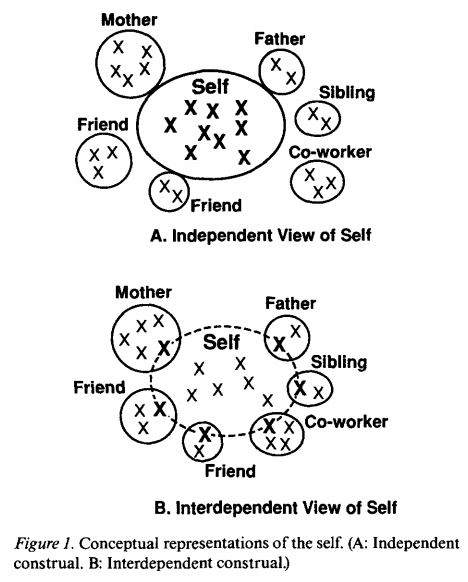We know that westerners and easterners think differently. Markus and Kitayama (1991) argue that different cultural thoughts come from different self concepts. Roughly speaking, a US citizen has an independent concept whereas a Japanese citizen has a dependent one.
Although this paper claims that Asians think similarly regardless of whether they are Chinese, Japanese, or Korean, they in fact do not necessarily behave in the same way. For instance, Asians seem to communicate in different modes depending on where they live.
I recently noticed significant differences in preferred water temperatures. At Hong Kong International Airport, Chinese airline passengers bypassed the drinking fountain entirely, instead opting to line up at a hot water dispenser with their own containers. In contrast, I cannot imagine Koreans doing the same, especially when cold water is readily available nearby. Cultural preferences in Asia is significant!


***
Reference
Markus, H. R., & Kitayama, S. (1991). Culture and the self: Implications for cognition, emotion, and motivation. Psychological review, 98(2), 224.
People in different cultures have strikingly different construals of the self, of others, and of the interdependence of the 2. These construals can influence, and in many cases determine, the very nature of individual experience, including cognition, emotion, and motivation. Many Asian cultures have distinct conceptions of individuality that insist on the fundamental relatedness of individuals to each other. The emphasis is on attending to others, fitting in, and harmonious interdependence with them. American culture neither assumes nor values such an overt connectedness among individuals. In contrast, individuals seek to maintain their independence from others by attending to the self and by discovering and expressing their unique inner attributes. As proposed herein, these construals are even more powerful than previously imagined. Theories of the self from both psychology and anthropology are integrated to define in detail the difference between a construal of the self as independent and a construal of the self as interdependent. Each of these divergent construals should have a set of specific consequences for cognition, emotion, and motivation; these consequences are proposed and relevant empirical literature is reviewed. Focusing on differences in self-construals enables apparently inconsistent empirical findings to be reconciled, and raises questions about what have been thought to be culture-free aspects of cognition, emotion, and motivation.

